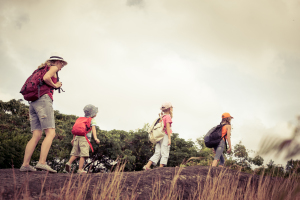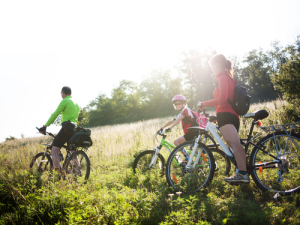The last day of the summer term is probably one of the best days in a child’s year, but for some parents, it can leave a sense of panic as to how they are going to keep their children amused and active for the next few weeks. The holidays can also be an extremely expensive time for parents as many days out can cost a small fortune. However, there are many ways that you can children can keep busy over the summer without spending too much money. In fact, the cheaper options can often be the best.
Fun in the Great Outdoors
1) Hiking
 Walking in the open countryside is a wonderful way to spend a day with your children. Cast aside technology and television for a few hours and spend some time appreciating the open air and all it has to offer. Getting out in the sunshine helps to provide your body with Vitamin D and is also a great way to exercise. Walking together gives you the perfect chance to talk to each other where you may not get the opportunity to normally. Britain has some breathtaking landscapes in its National Parks or for something closer to home a quick internet search should provide plenty of walks in you local area.
Walking in the open countryside is a wonderful way to spend a day with your children. Cast aside technology and television for a few hours and spend some time appreciating the open air and all it has to offer. Getting out in the sunshine helps to provide your body with Vitamin D and is also a great way to exercise. Walking together gives you the perfect chance to talk to each other where you may not get the opportunity to normally. Britain has some breathtaking landscapes in its National Parks or for something closer to home a quick internet search should provide plenty of walks in you local area.
Why not take a pocket guide to wildflowers or native birds along with you and discuss the various plants and how they reproduce and identify their different parts. Find out what your child has learnt with our worksheets about plants.
2) Outdoor Swimming
Swimming is another excellent form of exercise and outdoor swimming can be very exhilarating. The main priority is safety and natural water is something that needs to be respected. Please ensure before letting any member of the family near the water that it is safe to do so and it is not something that children should be encouraged to do without an adult present. But if you can find a clear lake, or a safe beach it can make for an excellent day out and another fun way of exercising. Visit one of the top 25 beaches in United Kingdom.
3) Camping

Nothing beats falling asleep under the stars and waking up to the sound of birdsong. Children can learn all the basic skills of camping such as setting up the tent, learning to build a campfire and surviving ‘in the wild’! It is also another perfect opportunity to take the time to discover more about the wildlife that is all around us.
Camping can take on many forms, from a family friendly campsite with various facilities to the more basic isolated retreats. And for those that would like to ease into the experience gently there is always the more luxurious ‘Glamping’ and these sites are popping up in more and more areas around the UK.
4) Zoos and Animal Parks
As mentioned in our previous blog post, visiting zoos and other animal parks is a great way to keep learning over the long break to prevent ‘Summer Learning Loss’. Try to attend the various talks given by the keepers during your visit to learn the most you can about the animals that you are visiting. If you don’t have a large zoo near you, farm experiences and smaller animal parks can sometimes give you the opportunity to get closer to the animals that your children may well have learnt about at school. Try to find out if they have studied any particular groups of animals or animals from a particular country and tailor your visit around this. The experience will really help to bring their learning to life and they will take great pleasure in sharing their knowledge with you. EdPlace also has the perfect worksheets to compliment your visit.
5) Theme Parks
For some families, no holiday is complete without the thrills and spills of a visit to a theme park. Children can’t get enough of all there is to offer so make sure you leave early and spend the whole day exploring. It can be nice to take a friend of the same age (if your budget allows) You never know, their parents may return the favour!
6) Sport
There are a vast array of sports to take part in and also go and watch so there is bound to be something to suit most families. See what your local leisure centre has to offer but also keep an eye out in the local press for summer programmes for many sports such as football, swimming, gymnastics, horse riding, cricket, the list is endless.
Watching live sport can also fuel the enthusiasm to take part, tennis courts are always busier during Wimbledon fortnight! See what local events there are in your area. Your child may be tempted to try something they had never previously considered. There is bound to be something to appeal to them from going to see their favourite football team play, to a local horse show.
7) Cycling

Like walking, cycling is a ideal way to explore the countryside and discover areas that may be right on you doorstep that you had never previously encountered. Take a picnic and your wildlife books and learn more about the things that we normally take for granted, whilst participating in a great form of exercise.
8) Local Events
The summer holidays is the perfect time to find out more about what’s going on in your area, and there will be plenty, so go along and support local events to keep these things going for another year. With various festivals such as food and music, carnivals and summer fairs there is bound to be something that will appeal.
9) Treasure Hunts and Geocaching
For a real sense of adventure and to give you children a chance to become explorers or detectives for the day, you could download a treasure hunt for your area or an area you may be visiting. This normally involves a guided walk whilst trying to solve clues which, when done in a group or just a pair, can encourage team building and problem-solving.
Another more high tech version of a treasure hunt is a new craze called ‘geocaching’. A handheld ‘GPS’ receiver or an app on your smartphone is used to navigate you towards a hidden box containing a log book that you can sign to say that you found the geocache and log the details online when you get home. Some boxes also contain small trinkets that people have left and you can take something along to swap so that you also have a prize for your hard work. A great way to involve the children in map reading and navigation whilst exploring an area of historical or geographical interest.








